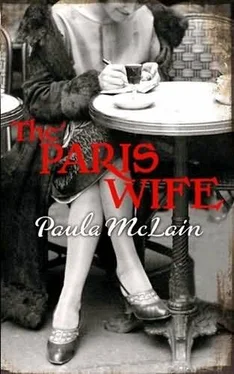“All right then,” Ernest broke in. “Let’s cut the postmortem, shall we? We’re sick enough as it is.”
“Let’s have something happy,” I said. “Tell us about the wedding, Don.”
Don flushed and looked to Beatrice. She was a very pretty Gibsongirl type, with a high forehead and red bow-shaped mouth, but just then she’d lost her composure. “I don’t think we should talk about it,” she said. “It doesn’t feel right.”
“Oh, that,” Ernest said. “You’ll get used to it.” His lips were tight and dry and his eyes were resigned. I could tell that all of this was going too fast for him but that he was playing through it anyway, following the gin and the blithe talk. The end had been coming for months and months, ever since our time at Schruns, but now that it was on us, we didn’t know what to do with it.
It wasn’t until the next afternoon, when we were on the train back to Paris, that the full weight of what was happening hit us both. The day was airless and oppressively hot, and the train was too full. We shared a sleeping compartment with an American woman who carried an intricately scrolled birdcage with a small yellow canary inside. Before we’d said more than hello to her, the woman launched into an elaborate story of how the bird was a present for her daughter who had been engaged to marry a Swiss engineer before she stepped in to break up the match. “I immediately saw how I needed to send him packing,” the woman said. “You know how the Swiss are.”
“Yes, of course,” Ernest said, tightening his lips around the words. He knew no such thing. “You’ll excuse me,” he said. “I think I’ll go and look for the porter.” When he came back, he was carrying a bottle of brandy and we drank it straight out of the water glasses on hand.
We were near Marseilles by then, and out the window everything seemed very dusty and white-gray-the olive trees, the farmhouses and fieldstone walls and hills in the distance. All of it looked strangely bleached out and the woman was somehow still talking about marriage and how she hoped her daughter would forgive her. I drank my brandy and had another and tried not to hear the woman at all. The bird chirped prettily, but I found I didn’t want to hear that either.
As evening fell, the woman finally closed her eyes and began to snore, her thick head nodding on her shoulders. We were coming into Avignon, where a farmhouse was on fire in a dry field. We could see the flames rising dramatically into the darkening sky and sheep running back and forth behind sagging fencing looking wild and panicked. The blaze must have announced itself early on, because much of the furniture was spread out in the field well away from the house while men worked to save what they could. I saw a pink enamel washtub and a rocking chair and a baby buggy on its side, and it was all utterly heartbreaking. This was someone’s life, a pile of furniture like matchsticks. It didn’t look rescued but abandoned-while smoke billowed in great plumes.
When we approached Paris, it was very near morning. Ernest and I had both slept very little all night, and we had talked very little as well. What we did was drink and look out the window, where it seemed the signs of destruction were unending. On the outskirts of the city, near Choisy-le-Roi, a wrecked baggage car steamed in a crush to one side of the tracks.
“Are we really going through with this?” I said to Ernest.
“I don’t know, are we?”
Just then, the American woman woke and stretched loudly and then took the velvet drape off the birdcage to wake the canary. Somehow it was morning and we were home, though it was hard to feel anything. I’d drunk so much brandy, my hands twitched with it and my heart thudded dully in my chest.
When we arrived at the train station, Ernest handed the porter our bags through the window and we walked out onto the platform. It was nearly September, and the morning air was cool and dewy.
“Sixty-nine rue Froidevaux,” Ernest told the taxi driver, and my breath caught in my throat. He was going to Gerald’s studio, not home with me. Not back to anything. It really was over.
“Why not just go to Pauline’s apartment directly?” I said.
“Please don’t start. This is painful enough.”
“What would you know about pain? You’re doing this, you bastard.”
I didn’t know what I was saying. The brandy was still clogging my bloodstream and moving my thoughts. For the moment, all I really knew was that I couldn’t be alone. I started to hyperventilate, and when Ernest moved closer, worried for me, I lashed out at him with the flat of my palm, hitting his chest, his shoulder, his jaw. Everything landed strangely, the way it does in dreams. My hand felt elastic and so did his body. I started to cry then and couldn’t stop.
“Pardon my wife,” Ernest said to the driver in French. “She’s not well.”
When the cab finally stopped, Ernest got out and came over to my side and opened the door for me. “C’mon then,” he said. “You need to sleep.”
I let him lead me up the stairs like a mannequin. Inside the studio, there was a cold concrete floor, a single table and two chairs, and a low sink with a pitcher and stand. He walked me over to a narrow platform bed and tucked me into it, pulling a red wool blanket up to my chin. Then he climbed behind me and brought his arms around and tucked his knees against the backs of mine, hugging me as tightly as possible.
“There’s a good cat,” he said to the back of my neck. “Please sleep now.”
I started to shake. “Let’s not do this. I can’t.”
“Yes, you can. It’s already done, my love.” And he rocked us back and forth as we both cried, and when I slept finally, I didn’t give in to it as much as I was taken over by it, like a sickness or like death.
When I woke up hours later, he was already gone. My head swam from the brandy and there was another level of nausea that came from a deep and unanswerable place. My life was in shambles; how would I right myself? How would I get through this? Picking up a piece of charcoal from a low table, I wrote him a note on sketchbook paper that was much calmer and more collected than I felt or even believed I could feel: So sorry for the scene in the cab. I’ve lost my mind, but I’ll do my best to be as good as I can about everything. I’ll want to see you, I will, but I won’t search you out .
I left the studio, locking the door behind me, and walked out into a little courtyard, where a stone bench sat flanked by coppery mums. The walls to each side were hung with ivy. This was what Ernest would see when he gazed out the studio’s window-a new view that had nothing whatever to do with me. I tried not to let this terrible thought chink away at my thin resolve as I climbed into a cab bound for the Hôtel Beauvoir on the avenue de l’Observatoire. This was the first place I thought of because it was right across the street from the Closerie des Lilas and I’d looked up at it a thousand times and admired its simple and well-made wrought-iron grille and its pots of geraniums. I would find a way to live through this. I would rent two rooms, one for me and one for Bumby. Marie Cocotte would return from Brittany with him the following week, and I’d write to tell her to bring him there. We could breakfast every morning at the Lilas. He could see his father often there, and other friends, too, and it would all be very familiar, and that would be important now.
As the cab moved slowly against traffic, I closed my eyes and tried not to think of anything except the café crème I would have very soon. I would make that last and then do what came next, whatever that was. All of my things were at the sawmill and they would have to be dealt with. I would ask Ernest to do it or hire someone, because I knew I couldn’t go back there. I wouldn’t. I didn’t. I never did again.
Читать дальше












